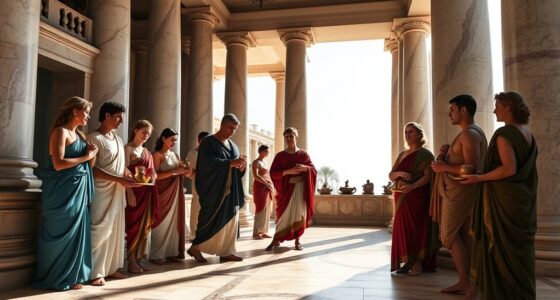Throughout history, birthday celebrations have evolved from ancient rituals honoring life, health, and spirits into modern festivities influenced by cultural traditions, religion, and social trends. Ancient practices included symbolic offerings like candles and flowers, while the Medieval and Renaissance eras showcased elaborate feasts and poetry. Today, media and technology shape how we celebrate, with personalized and sustainable options emerging. To discover how these customs continue transforming, explore the fascinating journey of birthday celebrations through the centuries.
Key Takeaways
- Early cultures used rituals and offerings to honor life, health, and spirits during birthday celebrations.
- Ancient civilizations like Egyptians, Greeks, and Romans incorporated symbolic gifts, candles, and community rituals.
- Medieval and Renaissance times emphasized wealth, social status, and cultural refinement through costumes, poetry, and grand feasts.
- Modern celebrations are heavily influenced by media, with social platforms and celebrities shaping trends and themes.
- Future birthdays will likely integrate immersive technology, personalization, and eco-friendly practices for more sustainable and interactive events.
Ancient Origins and Rituals
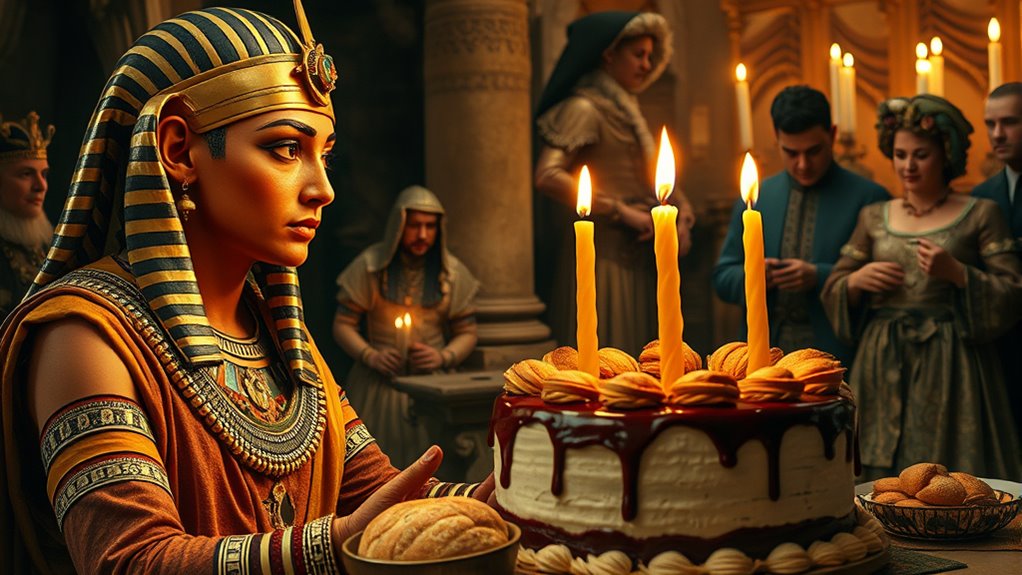
Have you ever wondered how birthday celebrations began? Early cultures marked birthdays with rituals to honor the individual’s life and good health. Gift giving customs originated as offerings to spirits or deities, symbolizing wishes for protection and prosperity. These gifts often carried birthday symbolism, representing hopes for a long life or happiness. Ancient Egyptians, Greeks, and Romans celebrated notable days by presenting tokens, which served as both good luck charms and symbols of respect. The rituals emphasized the significance of the individual’s life cycle, reinforcing social bonds and personal achievements. Over time, these practices evolved, but the core ideas of gift giving and birthday symbolism remain central to modern celebrations, linking us to our ancestors’ ways of honoring life’s milestones. Additionally, the tradition of singing birthday songs and blowing out candles has roots in ancient rituals meant to ward off evil spirits and ensure good fortune. These customs highlight the enduring human desire to mark special days with meaningful and protective traditions, connecting us across generations. Modern celebration customs, such as party decorations and themed gatherings, also trace their origins back to these ancient practices, helping to foster community and shared joy. Recent studies also show that these cultural practices help strengthen community bonds and cultural identity over centuries. Interestingly, the use of symbols like candles and specific foods in birthday celebrations can be linked to ancient artistic and cultural significance, which often aimed to invoke blessings and good luck.
Influences of Religious and Cultural Traditions
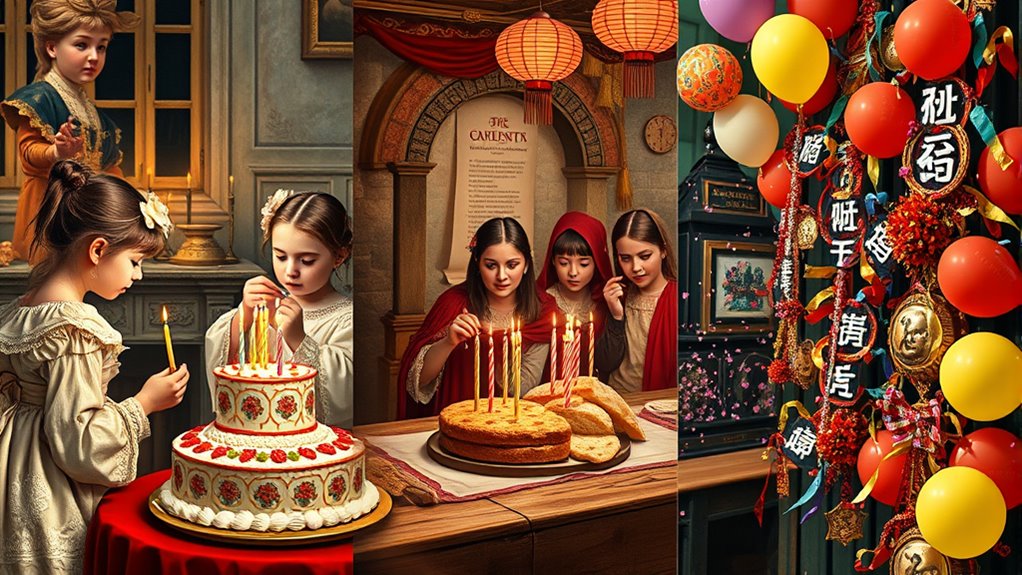
Religious and cultural traditions have profoundly shaped birthday celebrations across different societies. You might notice that many cultures include symbolic offerings, such as candles, food, or flowers, to honor deities or spirits. These offerings often symbolize gratitude or seek blessings for health and prosperity. Additionally, the role of attention during these rituals emphasizes the significance of focused participation in reinforcing spiritual connections. Festive attire also plays a vital role, with specific clothing or colors worn to mark the significance of the day, reflecting cultural identity or spiritual beliefs. In some traditions, wearing special garments shows respect or prepares the individual for a new phase in life. These customs help reinforce community bonds and spiritual connections, making birthdays more than just personal milestones; they become communal events rooted in shared history and belief systems. Furthermore, the use of symbolism in various rituals underscores the deeper meanings embedded in these celebrations, connecting participants to their cultural roots. The preservation of traditions ensures that these meaningful practices are passed down through generations, maintaining cultural integrity. Understanding cultural significance behind these practices can deepen appreciation for the diverse ways people celebrate life’s milestones worldwide. Recognizing the historical roots of birthday customs can also shed light on how these traditions have evolved over time.
The Medieval and Renaissance Era Celebrations
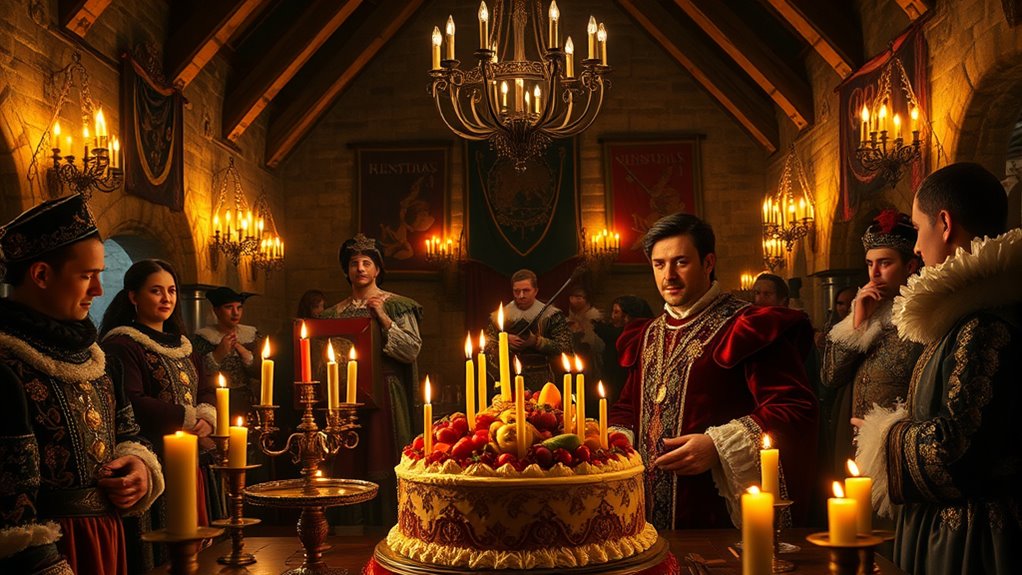
During the Medieval and Renaissance eras, birthday celebrations became more elaborate displays of wealth and social status. You might have attended costume parties, where participants dressed in finery to showcase their rank. Poetry recitations were common, honoring the birthday individual with personalized verses. Festivities often involved lavish feasts and entertainment to impress guests. The table below highlights key elements of these celebrations:
| Element | Description | Purpose |
|---|---|---|
| Costume Parties | Guests dressed in elaborate attire to impress | Show social standing and wealth |
| Poetry Recitations | Personalized poems composed for the birthday | Honor the individual and showcase culture |
| Lavish Feasts | Large meals with fine foods and wine | Celebrate and demonstrate prosperity |
These traditions reflected the era’s focus on display and cultural refinement.
Modern Customs and the Role of Media
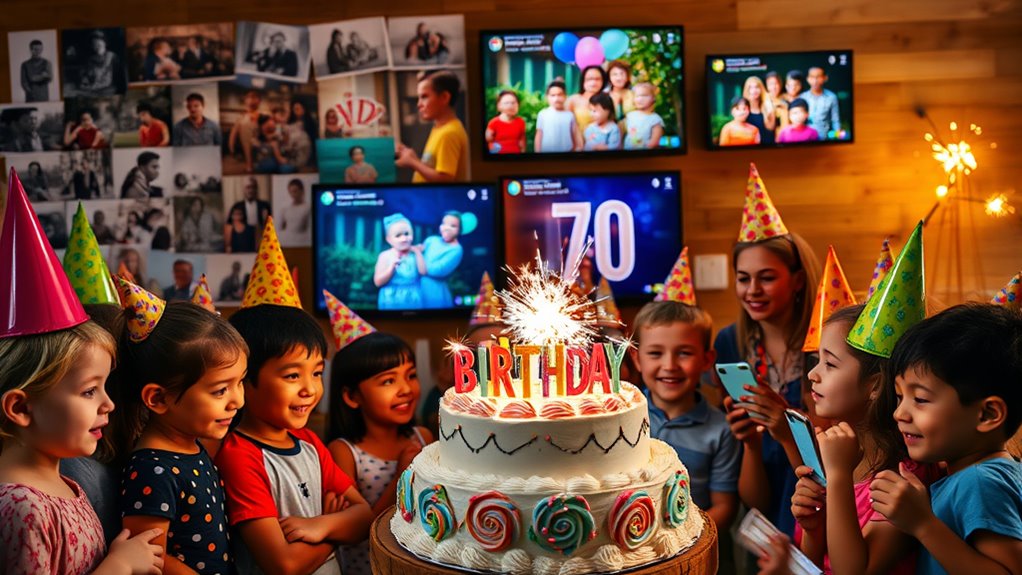
In today’s world, media plays a central role in shaping birthday celebrations, transforming how you mark your special day. Social media platforms like Instagram and TikTok enable you to share your celebrations instantly, often inspiring others with creative themes or elaborate cake designs. Celebrity parties set trends, making luxurious and unique events desirable to many. You might find yourself influenced by a trending hashtag or wishing to emulate a star’s lavish celebration. Media also amplifies the importance of photo sharing, likes, and comments, turning birthdays into digital moments of recognition. This shift elevates the celebration from a private event to a shared experience, where the online world influences your choices and adds excitement to your special day. The rise of social sharing encourages more personalized and visually appealing celebrations, further fueling the trend. Additionally, the media’s influence fosters a sense of community and connection, making birthday celebrations more interactive and engaging than ever before. The evolution of media continues to redefine how we perceive and enjoy these milestone events, emphasizing the role of digital culture in modern festivities.
Future Trends and Evolving Practices
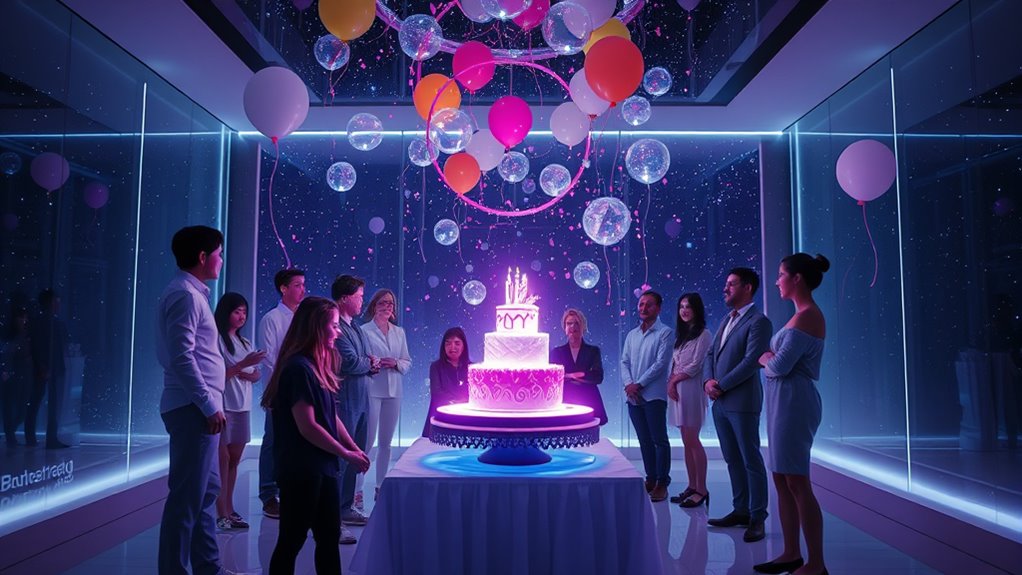
As technology continues to advance, birthday celebrations are poised to become even more personalized and immersive. Digital innovations like virtual reality and augmented reality will let you craft unique experiences, no matter where you are. You might host virtual parties that feel just as lively as in-person gatherings, with interactive games and customized avatars. Sustainability practices will also shape future celebrations, encouraging you to choose eco-friendly decorations, plant-based cakes, and reusable party supplies. These trends will help reduce waste while still making your special day memorable. Expect more personalized touches, like AI-curated playlists or smart lighting that syncs with your mood. Additionally, the integration of eco-conscious crafting will foster the use of sustainable materials in party decor and activities. Incorporating advanced projection technology can enhance visual displays and create immersive atmospheres for celebrations. The increasing adoption of digital customization tools will enable hosts to design highly tailored party experiences that reflect individual preferences. Moreover, leveraging AI in event planning will streamline organization and ensure personalized experiences for guests. As these innovations become more accessible, they will empower hosts to create meaningful celebrations that resonate deeply with attendees. Overall, future birthday celebrations will blend technological advances with eco-conscious choices to create memorable, sustainable experiences.
Frequently Asked Questions
How Did Birthday Celebrations Spread Globally Across Different Civilizations?
You see, birthday celebrations spread globally through cultural diffusion, where societies share traditions over time. As explorers, traders, and colonizers interacted, they introduced the ritual significance of birthdays to new civilizations. This exchange allowed customs like marking milestones and honoring individuals to adapt and evolve, creating a universal appreciation for birthday festivities. So, the spread hinges on shared cultural practices and the importance placed on personal milestones across different societies.
What Are Some Unique Birthday Traditions From Lesser-Known Cultures?
Imagine stepping into a world where cultural rituals and traditional attire shape birthday celebrations in extraordinary ways. In some cultures, like the Karo tribe of Ethiopia, you wear vibrant clothing and perform intricate dances to mark your birth. Others, such as the Inuit, celebrate with storytelling and symbolic gifts. These unique traditions highlight the rich diversity of birthday customs worldwide, emphasizing community, identity, and ancestral reverence.
How Have Birthday Songs Evolved Over the Centuries?
You’ll notice that birthday songs have evolved with changing musical styles and lyrical themes. Originally simple and repetitive, they’ve become more diverse, reflecting cultural influences and modern tastes. Today, you might hear upbeat pop tunes or heartfelt ballads, often personalized. Singers and communities adapt these songs to express love, gratitude, or humor, making each birthday celebration unique and vibrant through evolving melodies and meaningful lyrics.
What Role Did Early Birthday Gifts Play in Ancient Societies?
You might not realize it, but early birthday gifts held more than just material value—they symbolized trust and good intentions in ancient societies. Through ancient gift giving, people expressed cultural significance, fostering bonds and community ties. These gifts often represented blessings for health, prosperity, or protection, making them essential to social rituals. Their role was to deepen relationships and convey hopes for a prosperous future, shaping the importance of birthdays across civilizations.
How Might Future Technology Change Birthday Celebration Customs?
You might find future birthday celebrations transformed by virtual reality, allowing you to explore immersive environments from home. Personalized experiences will likely become more sophisticated, tailoring activities and gifts to your preferences through AI. Instead of traditional parties, you could celebrate with virtual gatherings, creating memorable moments regardless of distance. These technological advances will make birthdays more interactive, personalized, and accessible, changing how you connect and celebrate with loved ones in exciting new ways.
Conclusion
As you reflect on the journey from ancient rituals to modern festivities, you see how tradition and innovation intertwine. While medieval celebrations relied on simplicity and community, today’s parties thrive on media-driven spectacle. Yet, amid these shifts, the core joy of marking life’s milestones remains unchanged. The future promises even more personalized, immersive experiences—reminding you that, despite evolving customs, celebrating life’s moments continues to connect us across centuries.



